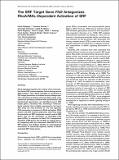| dc.contributor.author | Philippar, Ulrike | |
| dc.contributor.author | Schratt, Gerhard | |
| dc.contributor.author | Dieterich, Christoph | |
| dc.contributor.author | Engel, Felix B. | |
| dc.contributor.author | Keating, Mark T. | |
| dc.contributor.author | Gertler, Frank | |
| dc.contributor.author | Vingron, Martin | |
| dc.contributor.author | Nordheim, Alfred | |
| dc.contributor.author | Galgoczy, Petra | |
| dc.contributor.author | Schule, Roland | |
| dc.contributor.author | Muller, Judith M. | |
| dc.date.accessioned | 2014-01-06T15:33:12Z | |
| dc.date.available | 2014-01-06T15:33:12Z | |
| dc.date.issued | 2004-12 | |
| dc.date.submitted | 2004-10 | |
| dc.identifier.issn | 10972765 | |
| dc.identifier.uri | http://hdl.handle.net/1721.1/83480 | |
| dc.description.abstract | RhoA signaling regulates the activity of the transcription factor SRF (serum response factor) during muscle differentiation. How RhoA signaling is integrated at SRF target promoters to achieve muscle-lineage-specific expression is largely unknown. Using large-scale expression profiling combined with bioinformatic and biochemical approaches, we identified several SRF target genes, including Fhl2, encoding a transcriptional cofactor that is highly expressed in the heart. SRF binds the Fhl2 promoter in vivo and regulates Fhl2 expression in response to RhoA activation. FHL2 protein and SRF interact physically, and FHL2 binds the promoters of SRF-responsive smooth muscle (SM) genes, but not the promoters of immediate-early genes (IEGs), in response to RhoA. FHL2 antagonizes induction of SM genes, but not IEGs or cardiac genes, by competing with the coactivator MAL/MRTF-A for SRF binding. Our findings identify an autoregulatory mechanism to selectively regulate subsets of RhoA-activated SRF target genes. | en_US |
| dc.description.sponsorship | National Institutes of Health (U.S.) (Grant GM58801) | en_US |
| dc.language.iso | en_US | |
| dc.publisher | Elsevier | en_US |
| dc.relation.isversionof | http://dx.doi.org/10.1016/j.molcel.2004.11.039 | en_US |
| dc.rights | Article is made available in accordance with the publisher's policy and may be subject to US copyright law. Please refer to the publisher's site for terms of use. | en_US |
| dc.source | Elsevier Open Archive | en_US |
| dc.title | The SRF Target Gene Fhl2 Antagonizes RhoA/MAL-Dependent Activation of SRF | en_US |
| dc.type | Article | en_US |
| dc.identifier.citation | Philippar, Ulrike, Gerhard Schratt, Christoph Dieterich, Judith M. Müller, Petra Galgóczy, Felix B. Engel, Mark T. Keating, et al. “The SRF Target Gene Fhl2 Antagonizes RhoA/MAL-Dependent Activation of SRF.” Molecular Cell 16, no. 6 (December 2004): 867-880. Copyright © 2004 Cell Press | en_US |
| dc.contributor.department | Massachusetts Institute of Technology. Department of Biology | en_US |
| dc.contributor.mitauthor | Philippar, Ulrike | en_US |
| dc.contributor.mitauthor | Gertler, Frank | en_US |
| dc.relation.journal | Molecular Cell | en_US |
| dc.eprint.version | Final published version | en_US |
| dc.type.uri | http://purl.org/eprint/type/JournalArticle | en_US |
| eprint.status | http://purl.org/eprint/status/PeerReviewed | en_US |
| dspace.orderedauthors | Philippar, Ulrike; Schratt, Gerhard; Dieterich, Christoph; Müller, Judith M.; Galgóczy, Petra; Engel, Felix B.; Keating, Mark T.; Gertler, Frank; Schüle, Roland; Vingron, Martin; Nordheim, Alfred | en_US |
| dc.identifier.orcid | https://orcid.org/0000-0003-3214-4554 | |
| mit.license | PUBLISHER_POLICY | en_US |
| mit.metadata.status | Complete | |
